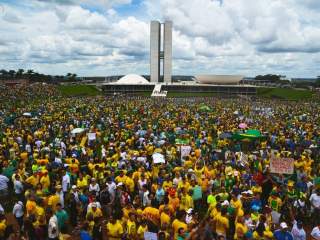Rousseff’s Fall and the Rise of Brazil’s Civil Society
The country is going through a “perfect storm” of challenges.
Just as Brazilian President Dilma Rousseff thought that her political situation couldn’t get any worse, the news broke on March 4 of the detention and indictment of former President Luíz Inácio Lula da Silva on charges related to corruption and money laundering. Lula, who is President Rousseff’s political mentor, was later appointed by her to a position of chief of staff to shield him from arrest.
As a result, Rousseff’s popularity—which is at an all-time low, now scratching single digits—is now taking down with it the image and public support of the Workers’ Party. The party—once one of the most popular in the world, winning each presidential election since 2003—has seen its public support in free-fall, leading to a paralyzing political crisis that Brazil has never before endured.
In addition to the political turbulence following the Petrobras scandal, the country is also being shaken by an escalating economic crisis, which is threatening to wipe out the economic gains achieved during Lula’s presidency. Low commodity prices resulting from China’s economic slowdown in the past two years have led to an economic decline for Brazil. This decline has now become a crisis, with Brazil’s GDP contracting by 3.8 percent in 2015, inflation hitting a twelve-year high in January 2016 at 10.71 percent, and the country’s currency devaluating from 2.5 reals against the dollar in 2013 to 4.25 in September 2015.
This Time Is Different
This is not the first time Brazil has experienced a corruption scandal or an economic crisis—nor in combination. In fact, for many years this has been the standard, with Brazilians joking that the country’s main export is corruption and prime import is ill government.
Yet today’s intense public reaction remains unprecedented. Indeed, Brazilians generally demonstrate a relatively apathetic attitude towards government corruption. So why is the people’s response different this time around?
Ironically, part of the reason may be the economic success and public policy of the Workers’ Party. Raising the minimum wage and implementing social welfare programs (e.g., Fome Zero and Bolsa Familia) led to the rise of a Brazilian middle class which is now the nation’s largest economic group, having grown from 38 percent in 2003 to 55 percent of the population in 2015.
Unlike in the past, when poor Brazilians were not as affected by economic situations, today’s crisis means members of the middle class risk falling back into poverty. The average unemployment rate in 2015 jumped to 6.8 percent from 4.8 percent in 2014—the biggest increase on record. As unemployment has grown, so have the fears of individual Brazilians who now worry about losing good jobs. This anxiety is now manifesting itself in the form of anger against Rousseff and her party, which are perceived to be failing to address the problem.
Brazil is also experiencing the rise of a civil society. Major demonstrations on and prior to March 13 were coordinated by social groups such as Movimento Brasil Livre (which is headed by young figures like Kim Patroca Kataguiri) and are utilizing social media platforms. With more than 110 million Brazilians now connected to the Internet, and 120 million owning mobile phones, this phenomenon is strong and is expected to grow. In addition, traditional media outlets such as Globo (the country’s largest media firm) are covering the topic—and are even becoming critical of the government, in what is considered to be a shift from usual policy.
The Silver Lining
Brazil is going through a “perfect storm” of challenges. This combination of an economic crisis, political turmoil and public unrest is perceived as the worst moment in the nation’s history since it became a democracy in 1985.
Yet the recent situation has brought positive structural changes unimaginable years ago. First, there are strong signs that the Brazilian public is restoring its trust in two institutions which are fundamental for any democracy: the Supreme Court and the Federal Police. Both are gaining support and appreciation from the public for acting impartially throughout the crisis, and for not backing down from anti-corruption efforts despite intense pressure imposed upon them. In addition, calls for the restoration of military rule or for the military to interfere have been rejected and condemned across the board—including by top army officials.
Second, many Brazilians are now talking politics at the dinner table. A rise in political awareness and a subsequent increase in expectations is a crucial phenomenon in any democracy. This rise in public consciousness, which is facilitated and strengthened by social media platforms, is forcing traditional media to cover Brazilian politics in a more critical matter—something which hasn’t been the case for many years.
Finally, unlike in other crisis situations, Brazilians do see an end in sight—either with the impeachment of President Rousseff or with the Workers’ Party presidency being replaced in the 2018 elections. Such change is considered to be worth waiting for.
Oren Kesler has been a Group Leader at the geopolitical consulting firm Wikistrat for the past five years. Prior to that he has worked as a journalist both in Israel and in Brazil for the BAND news corporation covering local news.
Image: Wikimedia Commons/José Cruz/Agência Brasil.

